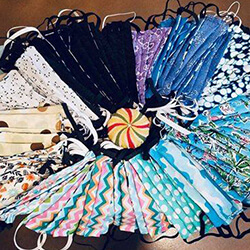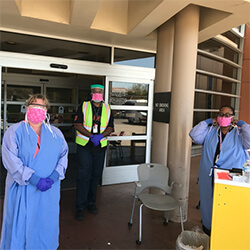Medical Students Make Masks to Help Protect Physicians on Frontlines of Coronavirus Pandemic
First-year medical students at the University of Arizona College of Medicine – Phoenix are donating handmade masks to local hospitals and clinics to help keep physicians and patients safe.

“It is hard to sit still in your house knowing the friends you’ve worked with in the past and the doctors you look up to are bravely going into rooms without the correct personal protective equipment,” medical student Kylie Kilian said. “As a first-year student, I often feel that I don’t know enough to help, but I learned through this that it is simply not true. There is always some way we can be helping, and I am glad I found a way to help in this wild time.”
First-year student Michele Wang echoed her thoughts. Wang, who loves to sew, said she felt the need to help as well.
“All of us wanted to do whatever we could,” Wang said. “I love sewing, so when I found out I could help medical professionals with one of my favorite hobbies, I was happy to do it.”
About 20 medical students are involved in creating and donating the masks. Since they started, outside groups have begun making masks to donate. Students have offered support in purchasing materials, sewing masks and delivering them to hospitals.
“The best part about this project is that it has grown so much,” said Nisha Rehman, another first-year student. “It started with a couple medical students wanting to do their part and now various communities in Phoenix, Mesa, Tempe and Scottsdale have joined the College of Medicine – Phoenix in making masks. In this uncertain and scary time, it’s nice to see communities coming together to make a positive difference.”
Kilian published a post on Facebook in an attempt to get mask donations, she said, but people came out of the woodwork asking for patterns and wanting to know how they could help. They’ve received fabric donations and interest from groups wanting to sew masks with them.
“It has been inspiring to see how even when people are physically separated, people are kind and helpful. I love that we can all be alone together through this project,” Kilian said.

“I hope the health care teams working right now feel seen, supported and more importantly, appreciated,” Isiah Romo said. “As first-year medical students, we really cannot help much in the hospital setting, but we can show all of the doctors, physician assistants, nurses, techs, scribes that we are on their side and will do whatever we can to support them.”
To inquire about donations of personal protective equipment or supplies for masks, please contact Isiah Romo.
Topics
About the College
Founded in 2007, the University of Arizona College of Medicine – Phoenix inspires and trains exemplary physicians, scientists and leaders to advance its core missions in education, research, clinical care and service to communities across Arizona. The college’s strength lies in our collaborations and partnerships with clinical affiliates, community organizations and industry sponsors. With our primary affiliate, Banner Health, we are recognized as the premier academic medical center in Phoenix. As an anchor institution of the Phoenix Bioscience Core, the college is home to signature research programs in neurosciences, cardiopulmonary diseases, immunology, informatics and metabolism. These focus areas uniquely position us to drive biomedical research and bolster economic development in the region.
As an urban institution with strong roots in rural and tribal health, the college has graduated more than 1,000 physicians and matriculates 130 students each year. Greater than 60% of matriculating students are from Arizona and many continue training at our GME sponsored residency programs, ultimately pursuing local academic and community-based opportunities. While our traditional four-year program continues to thrive, we will launch our recently approved accelerated three-year medical student curriculum with exclusive focus on primary care. This program is designed to further enhance workforce retention needs across Arizona.
The college has embarked on our strategic plan for 2025 to 2030. Learn more.